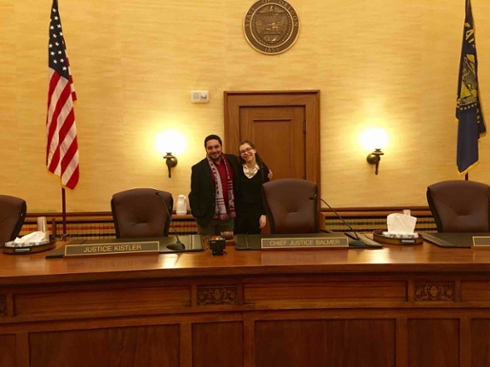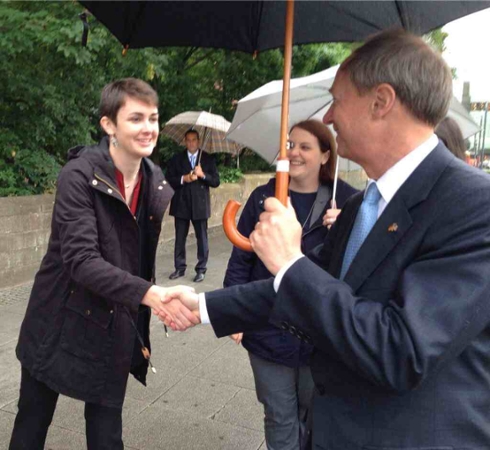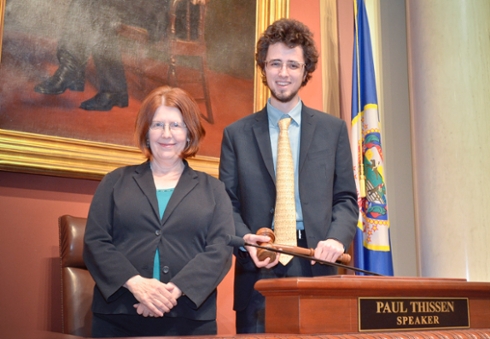Tags
"politics"
Oregon State Bar: Cristobal Mancillas, Winter Shadow 2016

Really… law school? That’s almost always what I end up hearing after I tell people that I have decided to apply for law school. As a thesising senior the two questions I am almost always asked are: What is your thesis about and what are you doing after Reed? Usually I smile, talk about my thesis for a bit but then reveal that I want to pursue law. The reactions are usually pretty polarized. Some people are excited and talk about a relative who’s a lawyer, or they look me in the eyes with genuine concern and ask why. They ask me why like I am about to voluntarily inject myself with some terrible disease. Why law school? After spending some nights working on Logic problems at my thesis desk and silently freaking out about all the debt I am about to accrue I started to understand the concern. When I heard about the Externship in the Oregon Bar, I knew this would be great opportunity to learn and ask others the same question: why pursue law?
I spent a few days as an extern with the Oregon Bar. I was lucky to have a fantastic and generous host, Amber Hollister, a former Reedie and General Councilor at the Oregon Bar. My goal was to learn about the dynamics of the legal profession here in Oregon but also the resources and opportunities available to me in the upcoming years as I work on my application materials. That I did, and also was able to meet a variety of inspirational and fascinating individuals who shared personal experiences that made me far more comfortable with the decision to pursue law.
For the first day, I shadowed different members of the Oregon Bar, learned how the bar regulates the legal profession, and about the services it offers to its members. I was really impressed by the work happening in the Diversity and Inclusion Division. I was able to meet the director and talk about the struggles that many young lawyers coming from marginalized communities often face and learn about the resources available to increase diversity in the legal profession here in Oregon. I felt like I was able to very honest with the director about my concerns and he even shared his own experience as a participant in some of the programs he now coordinates. I left feeling more optimistic about the prospect of pursing law school as well as enlightened about the difficulties I would likely face.
Continue reading Oregon State Bar: Cristobal Mancillas, Winter Shadow 2016
Oregon State Bar: Aliana Knoepfler, Winter Shadow 2016

This January I was able to spend three days shadowing Amber Hollister, the General Counsel at the Oregon State Bar. I went into the experience with a strong interest in the connection between law and ethics, but actually knowing very little about how the rules that govern lawyers play out in real life.
On the first day of the shadow, I was able to learn about the role of the disciplinary counsel at the Bar and about the process that occurs when somebody files an ethics complaint against the lawyer. During the next two days, I was able to see how these ethics rules get put into practice. I met with law students, lawyers, and even judges, which was an invaluable opportunity.
One of the most meaningful parts of my winter shadow experience was being able to meet Multnomah County Circuit Court Judge Adrienne Nelson and sit in on one of her court proceedings. Afterwards, she generously met with us and discussed her own experiences as a judge and a lawyer. I also had the honor of meeting United States District Court Judge Michael Simon and Oregon Court of Appeals Judge Christopher Garrett, who both went out of their way to answer our questions and share their experiences with us.
Continue reading Oregon State Bar: Aliana Knoepfler, Winter Shadow 2016
Frankfurt Consulate Public Affairs Internship, McGill Lawrence Internship Award, Nicole Thompson

Nicole Thompson ’16, political science-ICPS major, received the McGill Lawrence Summer Internship Award to work in Geneva as a member of the Frankfurt consulate's Public Affairs team.
It is comically difficult to summarize the events of this summer into a short and legible blog post. Perhaps that is the best way to summarize this adventure.
When I accepted the McGill-Lawrence award, my plan was to work for the US Consulate in Frankfurt, Germany. Two weeks before my departure I was notified that issues with my security clearance meant this was a no-go. Three days later, thanks to the grace of some higher power and the inhuman prowess of our own Brooke Hunter, I had secured a position in Geneva with the WHO. The next morning I received an email congratulating me on my approved security clearance and welcoming me to the Frankfurt consulate's Public Affairs team.
Continue reading Frankfurt Consulate Public Affairs Internship, McGill Lawrence Internship Award, Nicole Thompson
Reed Winter Externship Reflections 14: Number sixteen, Minnesota House of Representatives, Paul Messick

State government doesn't get much love from pop culture. There's glamour in Washington D.C., (House of Cards, The West Wing) and there's down-home folksy know how at the municipal level (Parks and Recreation), but state government is a black hole where entertainment magnates dare not tread. Over the course of my externship working along side a state legislator, I learned that state government (or at least my state government at home in Minnesota) is more deserving of a long-running Emmy award-winning television series than federal or municipal government. While municipal budgets are collapsing and Washington is gridlocked, state governments are, due to a number of factors, quietly wielding more and more influence over the way federal policies are implemented and designed. Moreover, with Washington caught in its own headlock, states are being tasked with solving big problems on their own. I interned with Tina Liebling — my local House representative, and mother of Sam Liebow, '14. Rep. Liebling is the chair of the Health and Human Services committee in the Minnesota House of Representatives. For a week, I watched as Liebling and her staff geared up for an extremely short legislative session -- in the words of my Governor, Mark Dayton, an "un-session." The short length of this “un-session" is meant to force Democrats and Republicans to get their grievances worked out before their bills hit the floor. During my externship, Liebling and her staff were setting her committee's schedule for the upcoming session. This meant meetings with lobbyists, constituents, and other legislators. I had the opportunity to sit-in on some of these meetings, mostly those between Rep. Liebling and a lobbyist or lobbyists. As someone who had never met a lobbyist before, listening and watching them work was quite interesting. A few of the lobbyists I met seemed like very highly-paid, extremely-biased research assistants. These lobbyists laid out a problem, a solution and, frequently, gave Rep. Liebling a bill to sponsor. Other lobbyists seemed like professional hand-holders, navigating their clients through the political process, and keeping them on message. The importance of lobbyists became clear to me over the course of the externship. It is simply impossible for a legislator to have an encyclopedic understanding of every topic they will encounter from medical licensing disputes, to volatile organic compounds. Lobbyists pass on information in thirty minutes that would take a legislator a week to research, allowing the legislator to craft a more informed opinion on the subject. The trick, I think, is to separate the facts from the spin. The better the lobbyist, the more difficult making that distinction becomes. I found myself trying to disentangle truth and “industry opinion” quite a lot over the course of the externship. I was tasked with researching and writing a report on the long-term care insurance market during my externship. The cost of long-term care is spiraling out of control. Minnesota’s “Medical Assistance” program (our version of Medicaid) could be spending $5 billion on long-term care in 2035 — which could bankrupt Medical Assistance entirely. Every stakeholder has a different solution to this problem, from massive tax incentives to entice people to purchase long-term care insurance, to mandating every man, woman, and child to carry long-term care insurance. If you want to read more about the advantages and disadvantages of currently proposed solutions and the long-term care insurance market, you can access my report here:
https://app.box.com/s/aooz4jur2fczp7nl0adg
